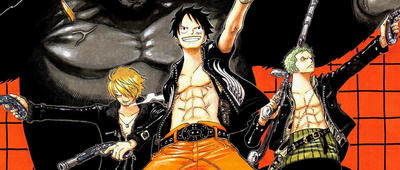There are many instances in fiction where an author will take a common word and use that word with different purpose than its intended meaning. Take Star Wars for example. Is "the Force" meant to simply be someone using force, as in 'to drive or compel against resistance'? No, it is simply a word that the author used to define a unique ability or power that exists only in the domain of the universe he created. He simply chose the word because its real definition is fitting for what it is.
Holy crap, that's the worst haki argument ever! No, seriously! Why? Because "The Force" is not only used in a different context than what you're saying, he didn't change the definition at all! Oh, Dictionary!
force /fɔrs, foʊrs/  Show Spelled Pronunciation [fawrs, fohrs]
Show Spelled Pronunciation [fawrs, fohrs]  Show IPA noun, verb, forced, forc⋅ing.
Show IPA noun, verb, forced, forc⋅ing.
–noun
1.physical power or strength possessed by a living being: He used all his force in opening the window.
2.strength or power exerted upon an object; physical coercion; violence: to use force to open the window; to use force on a person.
3.strength; energy; power; intensity: a personality of great force.
4.power to influence, affect, or control; efficacious power: the force of circumstances; a force for law and order.
5.Law. unlawful violence threatened or committed against persons or property.
6.persuasive power; power to convince: They felt the force of his arguments.
7.mental or moral strength: force of character.
8.might, as of a ruler or realm; strength for war.
9.Often, forces. the military or fighting strength, esp. of a nation.
10.any body of persons combined for joint action: a sales force.
11.intensity or strength of effect: the force of her acting.
12.Physics. a.an influence on a body or system, producing or tending to produce a change in movement or in shape or other effects.b.the intensity of such an influence. Symbol: F, f
13.any influence or agency analogous to physical force: social forces.
14.binding power, as of a contract.1
5.Baseball. force play.
16.value; significance; meaning.
17.Billiards. a stroke in which the cue ball is forcibly struck directly below the center in such a manner as to cause it to stop abruptly, bound back, or roll off to one side after hitting the object ball.
Making your example even worse is the fact that "haki" is a common Japanese word, used in the same context and manner of that Japanese word. He isn't making a noun out of a verb, here. Now, if you've just got a boner for the Japanese language and think it's so magically deep, fine. You'd look silly, but at least be honest about it. Don't try to sell some bullshit that it's a magic, untranslatable word. It didn't fly with "nakama," and it ain't gonna fly here. All it is is ambition, spirit and willpower. The Japanese may have one word for all that, but we don't. We do, however, have the ability to perfectly and easily translate it.








 [/hide]
[/hide]
 [/hide]
[/hide]